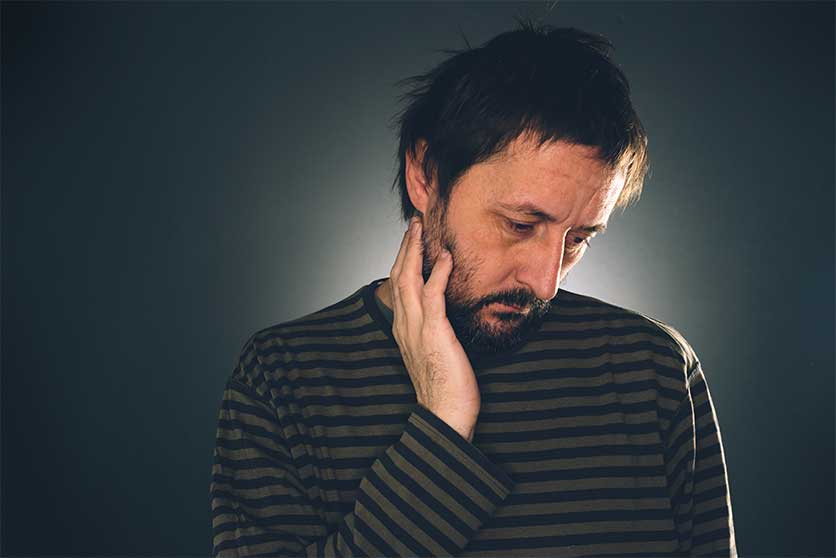Alcoholism & Suicidal Ideation | Connection & Treatment

Medically Reviewed By: Manish Mishra, MBBS
Some people with alcohol use disorder (AUD) may struggle with thoughts of suicide. Treatment options such as behavioral therapy and withdrawal management can help stabilize your mental health in the long term.

Alcoholism, also known as alcohol use disorder or AUD, is linked to an increased risk of suicidal ideation, suicidal thoughts, and suicidal behavior.
Alcoholism is a mental health disorder where you cannot stop drinking alcohol. Suicidal ideation is defined by frequent or overwhelming thoughts of suicide. While suicidal ideation is not an official mental health condition, it can be a sign of another underlying mental health problem.
In one study, about 40 percent of AUD patients reported at least one suicide attempt.
In Ohio, suicides are a leading cause of death with about 1,500 suicides occurring every year. If you or a family member are struggling with alcohol abuse and thoughts of suicide, professional care at Ohio Recovery Center can help.
The Connection Between Alcoholism & Suicidal Ideation
Alcohol use has been correlated with a higher risk of suicide attempts and suicide deaths. One study reported that people who abused alcohol were about 4 times more likely to attempt suicide compared to the general population.
However, the exact relationship between alcohol misuse and suicidal ideation is unclear. More research is likely needed to determine how alcohol changes or affects suicidal thoughts, attempts, and behaviors.
Symptoms Of Alcohol Use Disorder & Suicidal Ideation
Alcoholism is defined by an inability to stop drinking alcohol, even if it is hurting your well-being. Alcohol is habit-forming, which can make quitting drinking difficult.
Suicidal ideation is defined by persistent or overwhelming thoughts about taking your own life. Symptoms of alcohol use disorder and suicidal ideation may include:
- being unable to control your alcohol consumption
- experiencing alcohol withdrawal symptoms when you try to quit
- drinking alcohol to self-medicate your mental health
- spending a significant amount of time thinking about suicide
- wearing long sleeves to cover up self-harm
- talking about feeling hopeless or worthless
Suicidal ideation can sometimes, but not always, lead to suicidal behavior. On its own, suicidal ideation is not a mental health condition, but it can be a sign of severe distress and other mental health issues.
Risk Factors For Alcohol Use Disorder & Suicidal Ideation
Alcohol abuse is a significant risk factor for suicidal ideation and behavior, as alcohol can impair judgment, reduce inhibition, and reduce stress or guilt related to thoughts of suicide.
Drinking alcohol can also increase your risk of experiencing traumatic or stressful events, such as car accidents or sexual assault. These traumatic events can increase your risk of developing mental health problems and suicidal ideation.
Other predictors for developing AUD and suicidal ideation may include:
- engaging in heavy drinking (more than 8-15 drinks per week)
- engaging in binge drinking (more than 3-4 drinks in one sitting)
- traumatic or stressful events, such as losing a loved one or experiencing violence
- having another mental health disorder, such as bipolar disorder or depression
- drinking alcohol as an adolescent or young adult
- a family history of psychiatric or mood disorders
Dual Diagnosis Treatment For Alcohol Use Disorder & Suicidal Ideation
Suicidal ideation is a sign of an underlying mental health problem, such as severe depression, bipolar disorder, or post-traumatic stress disorder (PTSD). AUD can have a high comorbidity with these mental health problems.
Dual diagnosis treatment programs focus on treating both substance use disorders and other mental health conditions.
Psychotherapy
Cognitive behavioral therapy (CBT) can treat both alcoholism and mental health disorders such as bipolar disorders or depression.
Other psychotherapy options focus on the mental health conditions that lead to suicidal ideation. Exposure therapy treats patients with post-traumatic stress disorder (PTSD), while family therapy helps your loved ones understand your condition and needs.
The type of psychotherapy that works for you may depend on your mental health and specific needs.
Medication
Medication is an effective treatment option for alcohol dependence and withdrawal. Prescription drugs such as acamprosate and disulfiram can manage withdrawal and reduce cravings for alcohol. Medication for AUD is prescribed by accredited Ohio treatment providers.
Other medication for dual diagnosis treatment may depend on your mental health. Antidepressants may be prescribed to treat depression, bipolar disorder, or PTSD, while antipsychotics may be prescribed to treat mood or psychiatric disorders.
Integrated Treatment Options
Other integrated treatment options for alcohol use disorder and suicidal ideation may include:
- suicide prevention and education services
- attending support groups
- aftercare or discharge planning
- wellness exercises
Depending on your specific needs, you may be referred to inpatient or outpatient treatment services. Inpatient care helps patients with severe mental health problems or a high risk of suicide, while outpatient care helps patients without the need for 24/7 supervision.
Find Treatment In Ohio
If you or a loved one struggle with mental illness or thoughts of suicide, you may turn to substance abuse. However, alcohol or drug use is not a long-term solution for mental health problems.
At Ohio Recovery Center, our professional mental health and addiction treatment center provides the healthcare and support services you may need, including:
- detox programs
- medication-assisted treatment
- dual diagnosis treatment support
- aftercare planning
To find out if our mental health and addiction services work for you, your family member, or your loved one, please contact us today.
- International Journal of Environmental Research and Public Health https://www.ncbi.nlm.nih.gov/pmc/articles/PMC2872355/
- PLOS ONE https://journals.plos.org/plosone/article?id=10.1371/journal.pone.0126870

